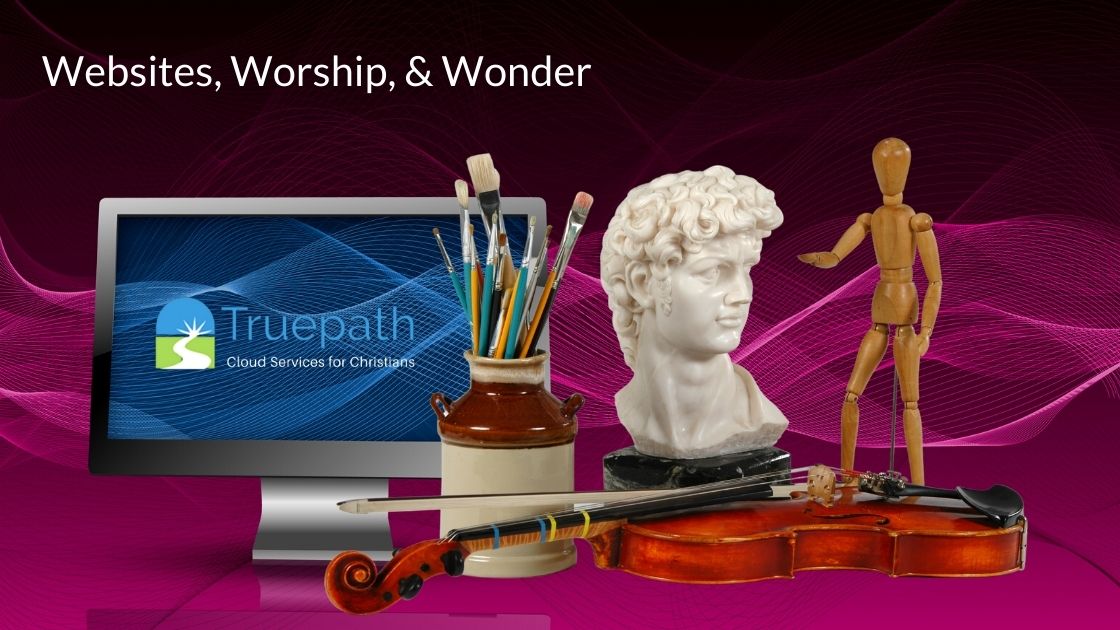Websites, Worship, and Wonder
Have you ever stopped to think how we love to be dazzled? How we’re designed with 5 distinct “aesthetic detectors” to take in and enjoy a multitude of wonders?
We often take it for granted that we can:
- smell and taste delicious foods
- hear wonderful music and the voices of loved ones
- see marvelous sunsets
- feel smooth and textured surfaces - from another’s hand to a craftsman’s carvings
From sunsets to sonnets, symphonies to slam dunks, we’re built for wonder – it’s how we’re made.
In addition, we are worshipping creatures; we can’t help but ascribe worth to something or someone (See Romans 1:24,25).
Making a meal? Changing a car tire? Designing a ministry website? You are engaging in worship.
The composer Bach knew it; it’s why he inscribed the letters “S. D. G.” (Soli Deo Gloria—“To God alone, the glory”) at the end of his compositions. It’s also why Paul could write, “Whatever you do, whether you eat or drink, do all to the glory of God” 1 Cor. 10:31.
If this is all true, an important question applies: should art and artistry play a role in worship? Or is mere functionality sufficient?
Dr. J. Frederick Davison, formerly of Fuller Theological Seminary, says,
“Once I was asked, “What do you have if you take the arts out of worship?” Though it sounded like the setup for a joke, I sensed there was a serious response coming my way, so I asked for the answer. “A lecture and a prayer meeting,” was the reply. I spent a considerable period of time thinking about that offhand comment. It was a revelation for me.”
Though speaking about formal worship, Davison is tapping into a larger, yet often overlooked truth: God is never boring, nor is he prosaic in his communications to us.
His revealed Word is a rich and unfolding tapestry; even a cursory look at the Psalms reveals his concern to invite us into a full range of human expression.
As we engage in the Arts, then, we have the capacity to both worship and reflect the Great Artist who daily paints the skies and all creation with rich colors and textures; who makes lush forests and flowers, sparkling seas, and humans to image him.
In this sense, as John Witvliet points out, the arts are both expressive and transformative.
How can you add such artistry to your website and ministry designs? Much could be said, but we’ll provide just two thoughts here:
1. Pursue excellence.
Have you noticed that God isn’t superficial or cheap in his creation? The heavens themselves “… declare the glory of God, and the sky above proclaims his handiwork” Ps. 19:1.
His elaborate and flawless designs reveal a myriad of birds, bees, flowers, and trees.
As we study these works, we see that God’s designs are multifaceted and deep; aesthetically rich as well as functionally profound. They are designed to elicit praise, to provoke awe and wonder.
Or think of the structure and beauty of the human eye, for instance. Even a superficial look can provoke praise and contemplation. Truly, human beings are “fearfully and wonderfully made” (Ps. 139:14).
We honor God and his artistry then as we skillfully, wisely, and beautifully create in whatever we do; in a sense, we become “co-creators” with him. Recognizing this helps us more winsomely “declare his glory among the nations, his marvelous works among all the peoples!” 1 Chron. 16:24
Do our websites and ministries give visitors even a glimpse of such a God?
Of course, this doesn’t mean that you need to strive for the Sistine Chapel ceiling on every page of your site. There can also be beauty in simplicity, and sometimes less is more.
Keep in mind that too much clutter can also cause web pages to load slower and/or perform poorly on mobile devices.
2. Reveal Wonder
The central focus of God’s Word is the unfolding revelation of Christ (Lk. 24:27; 1 Cor. 2:2). Yet, Jesus Himself is more than just “a way to get saved.” He is the Creator-Artist as well as Redeemer: “All things were made through him; without him, nothing was made that has been made” (Jn. 1:3).
This means that the beauty of creation: people and plants, skies and seas, music and mountains, all bear his stamp, his goodness, his signature. (Any philosophy that implies a “matter is evil, spirit is good” dualism, therefore, should be rejected).
As Creator and Sustainer, God cares deeply about this material world – so much so, that he is restoring all things even now. One day, the creation that now experiences the curse and sin’s corruption will be completely “liberated from its bondage to decay” (Rom. 8:21). God’s children will inhabit a new, physical earth, rich with variety. Above all, we will “see his face” (Rev. 22:4).
All of this goodness, beauty, and love should provoke wonder, a full-bodied appreciation of God’s goodness and manifold gifts.
May we strive to imitate him as we strive for excellence, avoid the superficial, and create for his glory!

